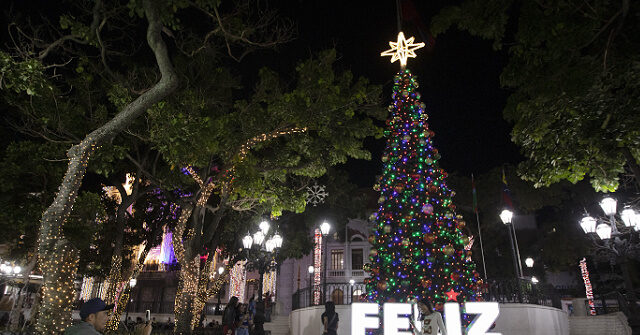The Venezuelan socialist regime, led by Nicolás Maduro, commenced the distribution of a “Christmas” stipend on October 10, 2023, directing the citizens to celebrate Christmas earlier than usual. This stipend, totaling 180 Venezuelan bolivars (approximately $4.70), is part of a campaign termed “Venezuela in Christmas.” The distribution is managed through the Patria platform—an initiative inspired by China’s social credit system, designed to control the allocation of essential resources, such as food and fuel. The regime utilized this platform to send notifications to recipients, promoting the early celebration of Christmas with messages emphasizing joy, peace, and security.
Maduro’s imposition of an early Christmas has persisted for six consecutive years, consistently overlapping with the traditional Christian observance of Advent, which begins four weeks prior to December 25. His decision follows a questionable re-election victory claimed during a July 2023 election, characterized by accusations of fraud. The early Christmas campaign is a strategic diversion to boost morale amid ongoing socio-economic turmoil, as Venezuela grapples with widespread poverty and political repression. The stipend distributed is insufficient, given that essential Christmas food items, like the traditional hallaca, cost between $4 and $6 per piece.
The stipends coincide with the traditional aguinaldo payments given to public sector workers, representing a Christmas bonus that typically equals two to three months’ wages or more depending on job status. Reports indicate the first month’s aguinaldo for public teachers is valued at about 506 bolivars or $13.40, highlighting that even combined with the Christmas stipend, ancillary financial support remains inadequate for families struggling to provide a celebratory meal or gifts during the holiday.
Critics of Maduro claim that the forced celebration and distribution of low monetary gifts serve primarily as a distraction from the government’s excessive repression of dissent. Analysts assert that the timing is conspicuously orchestrated to overshadow the brutal crackdown on protests following the disputed electoral outcome. With the United Nations estimating at least 25 fatalities and over 2,400 arbitrary detentions, including many minors, the ongoing oppression starkly contrasts with the regime’s festive narrative.
Compliance with Maduro’s edicts has also extended into the commercial sector, with authorities enforcing penalties on businesses that fail to display Christmas decorations by a mandated deadline. This enforcement illustrates the regime’s commitment to controlling public perception and expression under the guise of festive cheer. Local shopkeepers expressed their discontent, fearing financial repercussions even while acknowledging that the advance celebration is unlikely to boost sales.
The broader national sentiment reflects disillusionment amidst the artificial cheer orchestrated by the regime. Ordinary citizens see the insignificance of the stipend in the context of their struggles and resist the concept of an imposed Christmas atmosphere. The actions of Maduro’s regime are increasingly viewed as an attempt to manipulate public sentiment and distract from pressing issues of poverty and repression, revealing a deeper crisis within Venezuelan society struggling for momentum during the dire reality of ongoing socialist governance.

